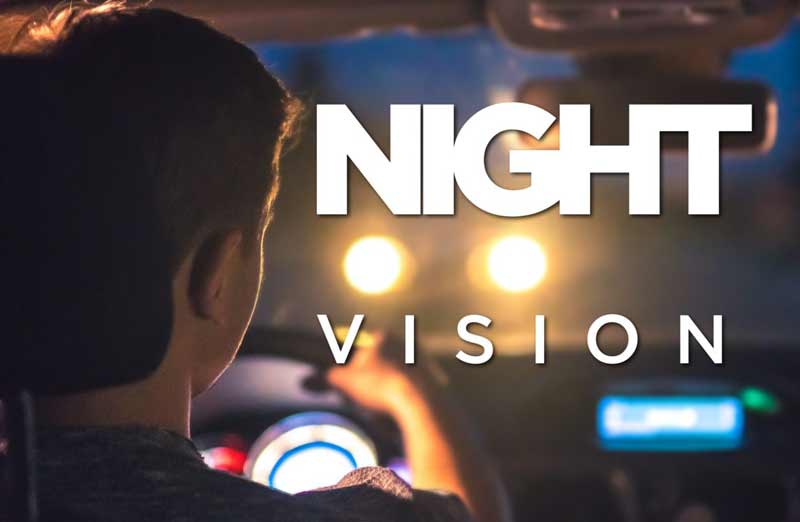As a kid, I remember wanting to be like Superman. Ah, to be faster than a speeding bullet and more powerful than a locomotive. But the one superpower I really wish I had now is night vision!
If you’re over 40, there’s a good chance you know exactly what I’m talking about. As we age, and especially after 40, the lenses in our eyes start to change, which affects our ability to see clearly—especially at night. In fact, people in their 50s generally require twice as much light to see well in the dark as someone in their 30s, according to the National Safety Council.
Most often, a decline in night vision happens gradually. For some, it might be a shift in your ability to focus on things in the distance, for others, you might need more light to see the words on a page. While driving, you might start to notice headlights from oncoming cars or the brightness of street lights bother you.
Other common problems people have with seeing at night include:
- Blurred focus
- Halos surrounding lights
- Tunnel vision
What causes night vision issues?
There are a number of reasons why you might experience problems with night vision, a condition that’s also known as nyctalopia, or night blindness. Experiencing “night blindness” doesn’t actually mean you can’t see at all at night, rather it’s more often an inability to see well at night or in low-light conditions.
Optometrists have found a lot of different changes in the eye that contribute to night vision issues. For some, just being nearsighted tends to lead to issues with how your eye processes light, especially at night.
For others, changes in the lens of the eye are to blame. According to Dr. Lance Kugler, an ophthalmologist and refractive eye specialist, the inside of the eye contains the crystalline lens, which controls roughly one-third of the eye’s ability to focus from far to near. As we age, our crystalline lens tends to change shape, becoming thicker and losing some of its ability to focus on nearby objects.
The lens of your eye also tends to become clouded and yellows a bit over time. This is typically the beginning of cataracts, which often prevents increasing amounts of light from reaching your retina. It can cause light to appear scattered and fragmented, creating the appearance of bright, distracting glares from lights.
Another contributing factor to night vision issues is the general weakening of the muscles in the iris, which are responsible for controlling the size of your pupil. As you age, these muscles react slower to the need to make the pupil bigger and let more light in.
All of these factors contribute to health and safety issues as we age, and nowhere is this more obvious, or dangerous, than driving after dark.
The dangers of driving with poor night vision

There are 3X more traffic deaths occurring at night than during daylight hours. Even more shocking, 75% of all driving happens during the day; that means the majority of all traffic deaths occur at night when just 25% of actual driving occurs.
While there are many factors contributing to the large disparity between nighttime and daytime driving fatalities, experts are certain that no factor, not even alcohol or fatigue, is as big of a contributor as the actual darkness itself. Considering that over 90% of driving reactions are dependent on vision, the serious risk of driving at night, especially as you age, becomes crystal clear.
Considering the danger associated with driving with night vision issues, it’s always advisable to avoid driving at night if possible. If you must drive at night, give yourself extra time, and drive slightly slower than normal. Keeping your windshield, mirrors, headlights, and even your eyeglasses clean, are also important steps to help reduce dangerous halos, glares, and blurred vision often experienced while driving at night.
If you are experiencing sudden night vision issues, especially when driving, make sure to check with your eye doctor. You might be experiencing a less serious, easily treatable condition like dry eye or even allergies.
Steps to improve your night vision
While there are some lifestyle changes you can take to delay the onset of night vision issues, there are also a few tips and strategies you can take to improve your night vision. The most important step is to protect your eyes by wearing sunglasses anytime you’re out in the sun.
The light of the sun literally bleaches out the photoreceptors in your eyes, which explains why you temporarily see white when coming inside on a bright sunny day. The longer you are in the sun, the longer it takes for your eyes to adjust.
The adjustment takes even longer as you age. With this condition—known as dark adaptation—your eyes take much longer to adapt to darker environments after being out in the light.
There are, however, some steps you can take to slow down, and in some cases, improve deteriorating night vision:
Eat a diet rich in Vitamin A and antioxidants
You’ve heard it since you’ve been a little kid, “Eat your carrots; they’re good for your eyesight.” Your grandma was right: carrots really are great for helping your night vision.

But it’s not just carrots that help support your night vision, it’s actually the vitamin A and antioxidants found in a host of fruits and vegetables, including dark leafy greens like spinach, kale, and swiss chard, and tomatoes, broccoli, cantaloupes, mango, and squash.
Vitamin A is an essential source of rhodopsin, a light-sensitive protein that makes up the rods in your retina. The specific beneficial antioxidants in green, yellow, and orange vegetables are zeaxanthin and lutein; these are carotenoids, or plant proteins, that help prevent free radicals from oxidizing and causing damage in the eyes.
Take care of your eyes like athletes take care of their bodies
Consider how professional athletes take care of the muscles in their body. They exercise their muscles, massage them, and make sure to give them the rest needed to grow, repair, and get stronger.
Remember, your eyes are muscles that require the same type of care. Like any other muscle, your eyes need exercise to stay strong and healthy.
Eye exercises you can do include:
- Focusing on fixed objects that vary in distance from near to far
- Changing focus by tracking a moving object
- Figure-eight eye movements
Get in the habit of doing a few sets each morning or before going to bed.
Everyone loves a great massage. Did you know your eyes do too?
Seriously, gently massaging your eyes can actually help improve night vision. Try it…
Close your eyes and use the palms of your hands to gently apply pressure and slow movement for 5 to 10 seconds. As you do this, you’ll notice everything will appear white before returning to black. As your vision returns to black, open your eyes; doing this massage routine daily and over time will strengthen the muscles responsible for helping your eye focus at night.
Like any muscle, your eyes need to rest and recover.

Pay attention when reading, working on a computer, or even when driving at night. When you notice your eyes feeling tired or a bit strained, take a few minutes to relax, close your eyes, and give your eyes a needed rest. For best results, get into the habit of doing this for at least 5 minutes every hour.
Finally, remember to have your eyes checked at least once a year by your ophthalmologist or optometrist to ensure there are no underlying issues affecting your night vision.

